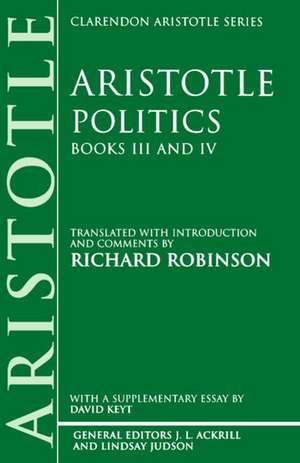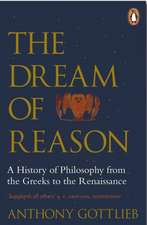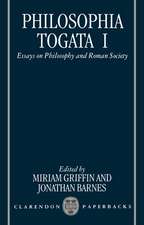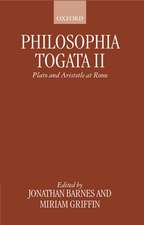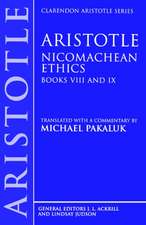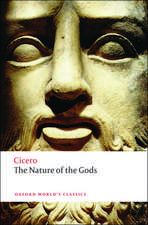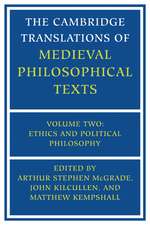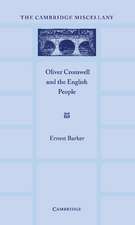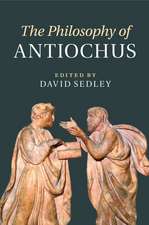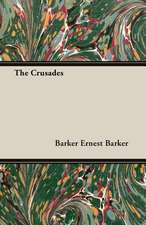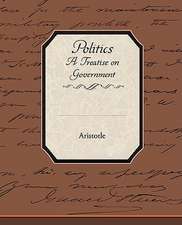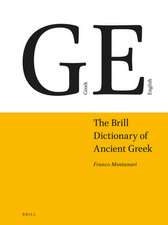Politics: Books III and IV: Clarendon Aristotle Series
Autor Aristotle Traducere de Richard Robinson Supliment de David Keyten Limba Engleză Paperback – 7 dec 1995
| Toate formatele și edițiile | Preț | Express |
|---|---|---|
| Paperback (10) | 60.52 lei 10-16 zile | +24.45 lei 4-10 zile |
| Oxford University Press – 26 feb 2009 | 60.52 lei 10-16 zile | +24.45 lei 4-10 zile |
| Headline – 13 oct 2022 | 74.58 lei 3-5 săpt. | |
| West Margin Press – 9 dec 2020 | 75.42 lei 3-5 săpt. | |
| Outlook Verlag – 24 sep 2019 | 390.01 lei 3-5 săpt. | |
| AZILOTH BOOKS – 28 iun 2018 | 70.60 lei 6-8 săpt. | |
| Lulu.Com – 6 apr 2017 | 88.85 lei 6-8 săpt. | |
| Sta – 15 mai 2024 | 137.84 lei 38-44 zile | |
| OUP OXFORD – 7 dec 1995 | 318.20 lei 31-37 zile | |
| Clarendon Press – 7 dec 1995 | 337.76 lei 31-37 zile | |
| OUP OXFORD – 27 noi 1997 | 338.37 lei 31-37 zile | |
| Hardback (7) | 109.45 lei 3-5 săpt. | |
| Mint Editions – 24 noi 2020 | 109.45 lei 3-5 săpt. | |
| Outlook Verlag – 24 sep 2019 | 427.42 lei 3-5 săpt. | |
| Lulu.Com – 6 apr 2017 | 189.67 lei 6-8 săpt. | |
| True Sign Publishing House – 20 ian 2023 | 222.58 lei 6-8 săpt. | |
| Sta – 15 mai 2024 | 224.93 lei 38-44 zile | |
| Clarendon Press – 7 dec 1995 | 698.45 lei 31-37 zile | |
| Clarendon Press – 27 noi 1997 | 699.50 lei 31-37 zile |
Din seria Clarendon Aristotle Series
- 18%
 Preț: 168.64 lei
Preț: 168.64 lei - 12%
 Preț: 345.64 lei
Preț: 345.64 lei - 12%
 Preț: 354.61 lei
Preț: 354.61 lei - 14%
 Preț: 331.61 lei
Preț: 331.61 lei - 28%
 Preț: 384.77 lei
Preț: 384.77 lei - 21%
 Preț: 422.45 lei
Preț: 422.45 lei - 28%
 Preț: 330.98 lei
Preț: 330.98 lei - 22%
 Preț: 317.93 lei
Preț: 317.93 lei - 13%
 Preț: 344.88 lei
Preț: 344.88 lei - 23%
 Preț: 320.59 lei
Preț: 320.59 lei - 17%
 Preț: 307.21 lei
Preț: 307.21 lei - 18%
 Preț: 321.93 lei
Preț: 321.93 lei - 25%
 Preț: 328.86 lei
Preț: 328.86 lei - 13%
 Preț: 349.94 lei
Preț: 349.94 lei - 12%
 Preț: 338.04 lei
Preț: 338.04 lei - 14%
 Preț: 337.93 lei
Preț: 337.93 lei - 22%
 Preț: 345.28 lei
Preț: 345.28 lei - 20%
 Preț: 271.24 lei
Preț: 271.24 lei -
 Preț: 345.85 lei
Preț: 345.85 lei -
 Preț: 245.35 lei
Preț: 245.35 lei
Preț: 318.20 lei
Preț vechi: 414.99 lei
-23% Nou
Puncte Express: 477
Preț estimativ în valută:
60.89€ • 66.12$ • 51.15£
60.89€ • 66.12$ • 51.15£
Carte tipărită la comandă
Livrare economică 11-17 aprilie
Preluare comenzi: 021 569.72.76
Specificații
ISBN-13: 9780198235927
ISBN-10: 0198235925
Pagini: 186
Dimensiuni: 138 x 217 x 11 mm
Greutate: 0.27 kg
Ediția:Revised
Editura: OUP OXFORD
Colecția OUP Oxford
Seria Clarendon Aristotle Series
Locul publicării:Oxford, United Kingdom
ISBN-10: 0198235925
Pagini: 186
Dimensiuni: 138 x 217 x 11 mm
Greutate: 0.27 kg
Ediția:Revised
Editura: OUP OXFORD
Colecția OUP Oxford
Seria Clarendon Aristotle Series
Locul publicării:Oxford, United Kingdom
Descriere
The third and fourth book of Aristotle's Politics discuss fundamental questions in political philosophy: the nature of citizenship, the purpose of the state, the role of law, the merits of various constitutions.Richard Robinson's volume was the first to be published in the Clarendon Aristotle Series, and it remains a model of its kind - a lucid and provocative Introduction, an accurate but readable translation, and concise and critical notes.For this reissue, David Keyt has written a Supplementary Essay, in which he surveys and develops some recent ideas on the main themes of Politics III and IV. He also provides an up-to-date bibliography.
Recenzii
Trevor Saunders' volume clearly meets the high standards of the Clarendon series...I found Saunders' translation on the whole excellent...Saunders' commentary is also superb : concise and clear, yet packed with information...His discussion is up to date, with plentiful references to the recent scholarly literature...illuminating and stimulating commentary. This book is a credit to the Clarendon Aristotle series and will prove indispensablefor serious students of Aristotle's Politics./Fred D. Miller/The Journal of the Society for Greek Political Thought Volume 15 Numbers 1 and 2 1998.
Clear and accurate translation of a key document in Western political thought, and in the understanding of the workings of political life in the ancient world.
This is a welcome addition to a reputable series. S's translation of the first two books of Aristotle's Politics is in smooth vernacular English, while remaining true to the literal meaning of the Greek text ... The translation given here by S. is especially admirable in that it is clear, consistent, and readable, unlike many recent translations that have tried to capture the almost crabbed style of Aristotle's Greek ... S's commentary is a model of its kind. It is concise, yet informative; covering the major scholarly disputes quite economically, while referring the reader to the best recent discussions of textual and interpretative problems.
Each volume in the scrupulously edited series offers literal translations and concise commentaries emphasizing important philosophical issues and holding Aristotle to the same exacting standards that one should expect of a contemporary philosopher ... Trevor Saunders' volume clearly meets the high standards of the Clarendon series ... very accurate and reliable ... Saunders' commentary is also superb: concise and clear, yet packed with information ... Aristotle's dependence on and departure from Plato's politics are nowhere more evident than in Politics I and II; and Saunders frequently puts his extensive knowledge of Plato's Republic, Statesman, and Laws to work in elucidating and evaluating Aristotle's numerous allusions to and criticisms of his former teacher ... This book is a credit to the Clarendon Aristotle series and will prove indispensable for serious students of Aristotle's Politics.
Trevor Saunders' Clarendon Aristotle edition of Politics I and II includes a short introduction with a discussion of the relation between the two books, a translation which is a revision of S.'s previous version in the Penguin Classics series, and an informative commentary which is a judicious blend of interpretation and criticism, especially in its assessment of Aristotle's treatment of his predecessors, particularly Plato. Allusions to subsequent political writing, in the broadest sense, include both Bagehot and Cornford's Microcosmographia Academica.
A welcome addition to the Clarendon Aristotle series is Trevor Saunders's Aristotle, Politics Books I and II. The translation is a revision of Saunders's earlier revision of T.A. Sinclair's version for Penguin. The commentary is full and helpful, but those familiar with Saunders's work on Plato's Laws will not be surprised to discover that the great strength of this volume is the sections in Book II dealing with comparative political systems.
Clear and accurate translation of a key document in Western political thought, and in the understanding of the workings of political life in the ancient world.
This is a welcome addition to a reputable series. S's translation of the first two books of Aristotle's Politics is in smooth vernacular English, while remaining true to the literal meaning of the Greek text ... The translation given here by S. is especially admirable in that it is clear, consistent, and readable, unlike many recent translations that have tried to capture the almost crabbed style of Aristotle's Greek ... S's commentary is a model of its kind. It is concise, yet informative; covering the major scholarly disputes quite economically, while referring the reader to the best recent discussions of textual and interpretative problems.
Each volume in the scrupulously edited series offers literal translations and concise commentaries emphasizing important philosophical issues and holding Aristotle to the same exacting standards that one should expect of a contemporary philosopher ... Trevor Saunders' volume clearly meets the high standards of the Clarendon series ... very accurate and reliable ... Saunders' commentary is also superb: concise and clear, yet packed with information ... Aristotle's dependence on and departure from Plato's politics are nowhere more evident than in Politics I and II; and Saunders frequently puts his extensive knowledge of Plato's Republic, Statesman, and Laws to work in elucidating and evaluating Aristotle's numerous allusions to and criticisms of his former teacher ... This book is a credit to the Clarendon Aristotle series and will prove indispensable for serious students of Aristotle's Politics.
Trevor Saunders' Clarendon Aristotle edition of Politics I and II includes a short introduction with a discussion of the relation between the two books, a translation which is a revision of S.'s previous version in the Penguin Classics series, and an informative commentary which is a judicious blend of interpretation and criticism, especially in its assessment of Aristotle's treatment of his predecessors, particularly Plato. Allusions to subsequent political writing, in the broadest sense, include both Bagehot and Cornford's Microcosmographia Academica.
A welcome addition to the Clarendon Aristotle series is Trevor Saunders's Aristotle, Politics Books I and II. The translation is a revision of Saunders's earlier revision of T.A. Sinclair's version for Penguin. The commentary is full and helpful, but those familiar with Saunders's work on Plato's Laws will not be surprised to discover that the great strength of this volume is the sections in Book II dealing with comparative political systems.
Notă biografică
Aristotle (Greek: ¿¿¿¿¿¿¿¿¿¿¿ Aristotél¿s, pronounced [aristotél¿¿s]; 384-322 BC)[A] was a Greek philosopher and polymath during the Classical period in Ancient Greece. Taught by Plato, he was the founder of the Lyceum, the Peripatetic school of philosophy, and the Aristotelian tradition. His writings cover many subjects. including physics, biology, zoology, metaphysics, logic, ethics, estheticspoetry, theatre, music, rhetoric, psychology, linguistics, economics, politics, and government. Aristotle provided a complex synthesis of the various philosophies existing prior to him. It was above all from his teachings that the West inherited its intellectual lexicon, as well as problems and methods of inquiry. As a result, his philosophy has exerted a unique influence on almost every form of knowledge in the West and it continues to be a subject of contemporary philosophical discussion. Little is known about his life. Aristotle was born in the city of Stagira in Northern Greece. His father, Nicomachus, died when Aristotle was a child, and he was brought up by a guardian. At seventeen or eighteen years of age he joined Plato's Academy in Athens and remained there until the age of thirty-seven (c. 347 BC).[4] Shortly after Plato died, Aristotle left Athens and, at the request of Philip II of Macedon, tutored Alexander the Great beginning in 343 BC.[5] He established a library in the Lyceum which helped him to produce many of his hundreds of books on papyrus scrolls. Though Aristotle wrote many elegant treatises and dialogues for publication, only around a third of his original output has survived, none of it intended for publication.[6] Aristotle's views on physical science profoundly shaped medieval scholarship. Their influence extended from Late Antiquity and the Early Middle Ages into the Renaissance, and were not replaced systematically until the Enlightenment and theories such as classical mechanics. Some of Aristotle's zoological observations found in his biology, such as on the hectocotyl (reproductive) arm of the octopus, were disbelieved until the 19th century. His works contain the earliest known formal study of logic, studied by medieval scholars such as Peter Abelard and John Buridan. Aristotle's influence on logic also continued well into the 19th century. He influenced Islamic thought during the Middle Ages, as well as Christian theology, especially the Neoplatonism of the Early Church and the scholastic tradition of the Catholic Church. Aristotle was revered among medieval Muslim scholars as "The First Teacher" and among medieval Christians like Thomas Aquinas as simply "The Philosopher". His ethics, though always influential, gained renewed interest with the modern advent of virtue ethics, such as in the thinking of Alasdair MacIntyre and Philippa Foot.
